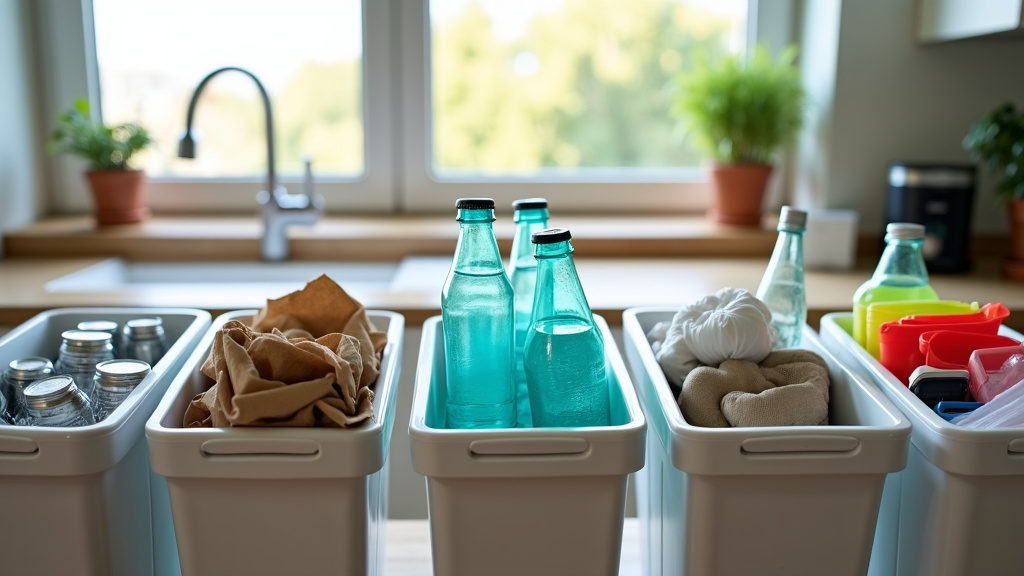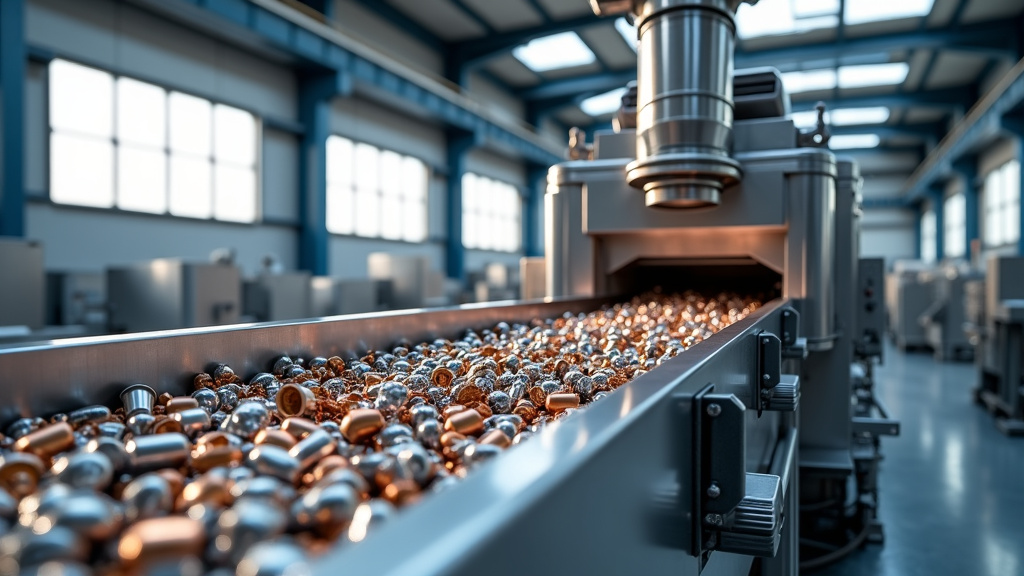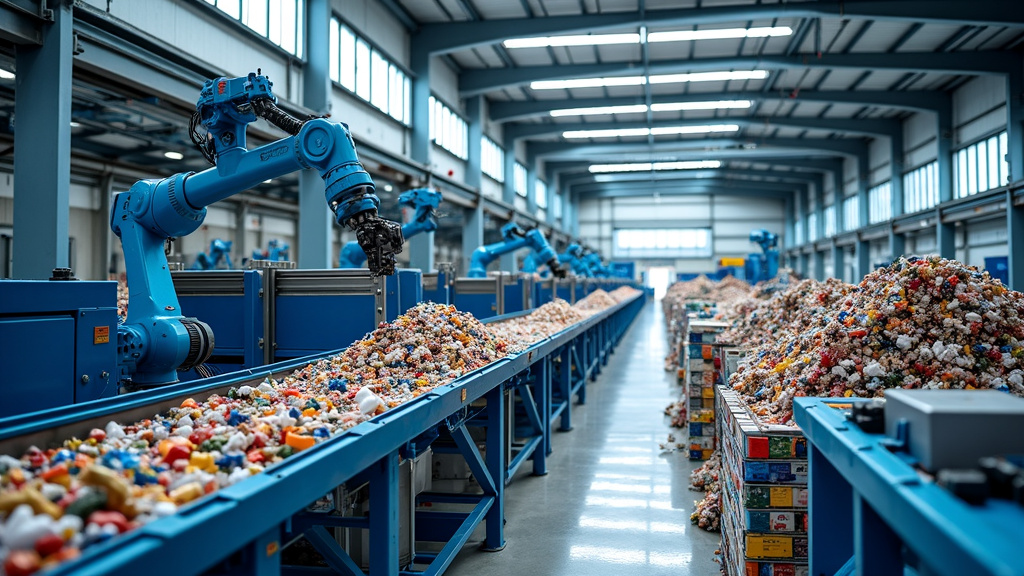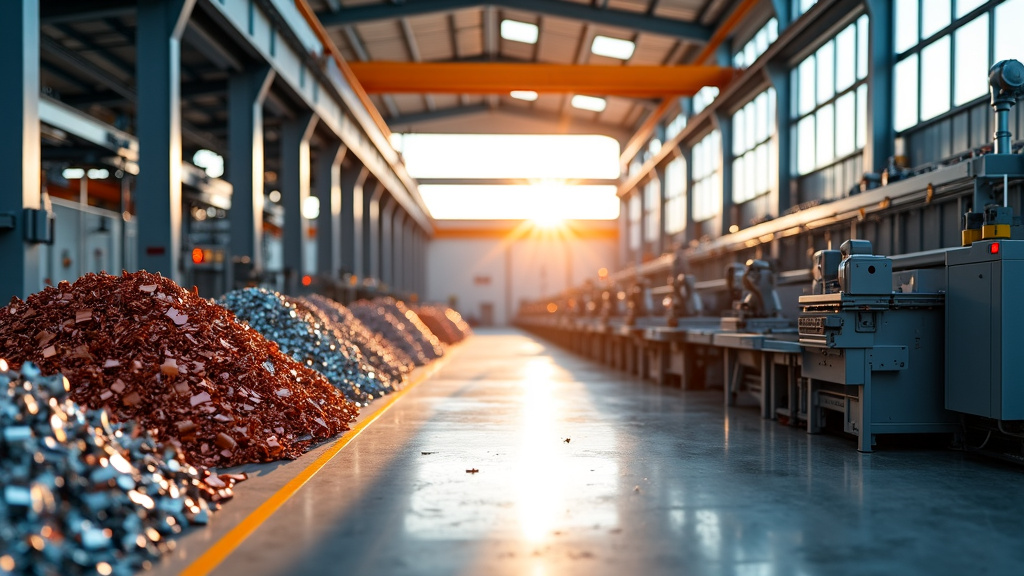5901 Botham Jean Blvd, Dallas, TX 75215
The Idea of Recycling: Exploring A Sustainable Future
April 13, 2025Have you ever paused to consider where all our discarded items end up? The idea of recycling offers a compelling solution to this pressing question. At its core, recycling transforms what we once deemed ‘waste’ into valuable resources, paving the way for a more sustainable future.
Recycling isn’t just a trendy buzzword; it’s a critical practice that’s reshaping our relationship with consumption and waste. By converting used materials into new products, we’re not merely reducing clutter – we’re actively participating in a cycle that preserves our planet’s finite resources.
Consider this: according to the Environmental Protection Agency, recycling and composting of municipal solid waste saved over 193 million metric tons of carbon dioxide equivalent in 2018 alone. That’s equivalent to taking millions of cars off the road for an entire year!
But the benefits of recycling extend far beyond reducing greenhouse gas emissions.
The Environmental Impact of Recycling
Recycling stands as a cornerstone of environmental conservation, offering a powerful solution to some of our planet’s most pressing challenges. By diverting waste from landfills, preserving natural resources, and reducing pollution, recycling plays a crucial role in building a more sustainable future.
One of the most significant benefits of recycling is its ability to reduce landfill waste. According to recent projections, global solid waste generation is expected to reach a staggering 3.8 billion tonnes by 2050. However, through effective recycling practices, we can dramatically decrease this number.
The impact of recycling on resource conservation cannot be overstated. By reusing materials, we significantly reduce the need for raw material extraction, which often involves environmentally destructive processes. For instance, recycling one ton of paper can save 17 trees and 7,000 gallons of water, highlighting the substantial resource savings achievable through recycling.
Energy Savings and Carbon Footprint Reduction
Recycling not only conserves resources but also leads to substantial energy savings. Manufacturing products from recycled materials typically requires less energy compared to using virgin resources. This energy efficiency translates directly into reduced greenhouse gas emissions and a smaller carbon footprint.
For example, producing aluminum cans from recycled materials uses 95% less energy than manufacturing them from raw bauxite ore. Such energy savings contribute significantly to mitigating climate change and promoting environmental sustainability.
Moreover, recycling plays a vital role in reducing air and water pollution. By minimizing the need for raw material extraction and processing, recycling helps decrease the release of harmful pollutants into our environment. This has far-reaching positive effects on ecosystems and public health.
The Global Impact of Recycling
The benefits of recycling extend far beyond local communities. On a global scale, recycling helps address some of the world’s most pressing environmental challenges. For instance, it’s estimated that recyclables save over 700 million tonnes of CO2 emissions annually, equivalent to taking about 150 million cars off the road for a year.
Despite these impressive statistics, there’s still room for improvement. According to the World Bank, at least 33% of municipal solid waste is not safely managed globally. This underscores the urgent need for more comprehensive recycling programs and increased public awareness about proper waste management practices.
Building a Sustainable Future Through Recycling
As we look to the future, the role of recycling in environmental conservation becomes increasingly critical. Advancements in recycling technologies, coupled with growing public awareness, offer promising prospects for further reducing our environmental impact.
From innovative sorting systems to chemical recycling processes that can handle previously non-recyclable materials, the recycling industry continues to evolve. These developments, combined with policy support and individual action, have the potential to significantly enhance global recycling rates and reduce our collective environmental footprint.
By embracing recycling in our daily lives and supporting comprehensive recycling programs, we can each contribute to a healthier planet. Every item recycled represents a step towards conserving our natural resources, reducing pollution, and building a more sustainable world for future generations.
Types of Materials That Can Be Recycled

Recycling plays a crucial role in waste management and environmental conservation. Understanding which materials can be recycled is essential for every household looking to reduce their environmental impact. Let’s explore the main categories of recyclable materials and some common household items that fall under each category.
Paper and Cardboard
Paper is one of the most commonly recycled materials, with a high recycling rate worldwide. Recycling paper helps conserve forests and reduces energy consumption in paper production. Various types of paper products can be recycled, including:
- Newspapers and magazines
- Office paper and envelopes
- Cardboard boxes
- Paper bags
- Phone books
However, it’s important to note that some paper products, such as those contaminated with food or grease, cannot be recycled. Always make sure your paper recyclables are clean and dry before disposing of them in the recycling bin.
Plastics
Plastic recycling can be more complex due to the various types of plastics used in consumer products. Most recyclable plastics are marked with a number inside a recycling symbol, indicating the type of plastic. The most commonly recycled plastics include:
- PET (polyethylene terephthalate) – used for soda bottles and food containers
- HDPE (high-density polyethylene) – used for milk jugs and shampoo bottles
- PP (polypropylene) – used for bottle caps and food containers
It’s worth noting that not all plastics are easily recyclable. Items like plastic bags, Styrofoam, and some types of food packaging may not be accepted in curbside recycling programs. Always check with your local recycling facility for specific guidelines.
Metal
Metal recycling is highly efficient and can save significant amounts of energy compared to producing new metal. Common household metal items that can be recycled include:
- Aluminum cans
- Steel food cans
- Foil and aluminum trays
- Metal bottle caps
Before recycling metal items, ensure they are clean and free from food residue. Some recycling centers may also accept larger metal items like appliances or electronics, but these often require special handling.
Glass
Glass is infinitely recyclable without loss of quality, making it an excellent material for recycling. Most household glass items that can be recycled include:
- Glass bottles (all colors)
- Glass jars
- Glass food containers
However, not all glass is recyclable. Items like window glass, mirrors, and light bulbs often require special disposal methods. Always rinse glass containers before recycling to remove any food or drink residues.
Electronics
Electronic waste, or e-waste, contains valuable materials that can be recovered through recycling. Many electronics stores and local recycling centers offer e-waste recycling programs for items such as:
- Computers and laptops
- Mobile phones
- Televisions
- Printers and ink cartridges
Proper disposal of electronics is crucial to prevent harmful substances from entering the environment. Always check with local authorities or electronics retailers for proper e-waste recycling options in your area.
The Recycling Process: From Waste to Resource

Recycling is a crucial process that transforms discarded materials into valuable resources, reducing waste and conserving our planet’s finite resources. Let’s dive into the fascinating journey of recyclables, focusing on metal recycling as an illustrative example.
Collection: The First Step Towards Sustainability
The recycling process begins with collection – a critical stage where individuals, businesses, and industries play a vital role. Picture this: that soda can you tossed in the recycling bin isn’t just trash; it’s the start of an incredible transformation.
Local recycling programs, scrap yards, and dedicated collection centers serve as the initial hubs for gathering recyclable metals. These facilities are the unsung heroes of sustainability, creating a centralized point for materials that might otherwise end up in landfills.
Ever wondered about the scale of metal recycling? It’s staggering. According to the U.S. Environmental Protection Agency, recycling just one aluminum can saves enough energy to run a TV for three hours. Now imagine the impact of millions of cans recycled daily!
Sorting: Bringing Order to Chaos
Once collected, the real magic begins with sorting. It’s like a massive treasure hunt, where valuable materials are separated from the rest. In metal recycling, this step is crucial and often involves both manual and automated processes.
Ferrous metals (those containing iron) are separated from non-ferrous metals using powerful magnets. It’s a sight to behold – picture a giant magnet hovering over a conveyor belt, plucking out steel and iron while leaving aluminum, copper, and brass behind.
But it doesn’t stop there. Advanced technologies like eddy current separators and optical sorters further refine the process, ensuring each type of metal is properly categorized. It’s a complex dance of physics and engineering, all in service of recycling efficiency.
Processing: Breaking It Down to Build It Up
With the metals sorted, it’s time for processing – the step that turns scrap into a valuable commodity. Massive shredders tear through metal items, reducing them to manageable pieces. The cacophony of grinding metal might be deafening, but it’s the sound of progress in the recycling world.
For metals like aluminum, the next step is often purification. Contaminants are removed through various methods, including chemical processes and intense heat. It’s reminiscent of alchemy, but with a modern, eco-friendly twist.
Did you know that recycling aluminum requires only 5% of the energy needed to produce new aluminum from raw materials? This energy saving is equivalent to the amount of electricity used by a typical household over three years!
Manufacturing: Giving New Life to Old Materials
The final stage of the recycling journey is perhaps the most exciting – manufacturing. This is where those shredded, purified metals are transformed into new products. Molten metal is poured into molds, rolled into sheets, or formed into various shapes, ready to begin life anew as anything from car parts to construction materials.
It’s a testament to human ingenuity that a discarded soda can could one day become part of a spacecraft or a wind turbine. The possibilities are nearly endless, limited only by our imagination and technological capabilities.
Understanding this intricate process highlights the importance of proper waste segregation and disposal. Every time we correctly sort our recyclables, we’re not just keeping our neighborhoods clean – we’re fueling an entire industry dedicated to sustainability and resource conservation.
So, the next time you’re about to toss that metal item, pause for a moment. Consider its potential journey from waste to resource. By participating in recycling, you’re not just disposing of trash; you’re taking an active role in a global effort to create a more sustainable future. Now that’s something to feel good about!
Challenges in Recycling and Overcoming Them

Recycling plays a crucial role in conserving resources and reducing waste, but the industry faces several significant hurdles. Let’s explore some of the key challenges in recycling and discuss practical ways to overcome them.
Contamination: The Recycling Killer
One of the biggest obstacles plaguing recycling efforts is contamination. When non-recyclable items end up in recycling bins, they can render entire batches of recyclable materials unusable. This issue stems largely from confusion about what can and cannot be recycled.
Common contaminants include food residue, plastic bags, and non-recyclable plastics. For instance, a greasy pizza box or a plastic toy mixed in with recyclable materials can lead to rejection of the entire load at recycling facilities. This not only wastes resources but also increases costs for recycling programs.
To combat contamination, education is key. Cities and recycling programs need to provide clear, consistent guidelines on proper recycling practices. Some communities have found success with visual guides and regular communication campaigns. As individuals, we can make a difference by taking the time to clean and sort our recyclables properly.
Pro tip: When in doubt, it’s better to throw an item in the trash than risk contaminating a recycling batch. Check with your local recycling program for specific guidelines, as acceptable items can vary by location.
Infrastructure Challenges: Building a Robust Recycling System
Another major hurdle is the lack of adequate recycling infrastructure in many areas. This includes everything from collection systems to processing facilities. In the United States, for example, only about 60% of households have access to curbside recycling programs, according to the Environmental Protection Agency.
Developing comprehensive recycling systems requires significant investment from both public and private sectors. Some cities have successfully implemented advanced sorting technologies, like optical sorters and AI-powered robots, to improve efficiency and reduce contamination. However, these solutions can be costly and may not be feasible for smaller communities.
Overcoming infrastructure challenges calls for a multi-faceted approach. This might include public-private partnerships to fund new recycling facilities, incentives for businesses to invest in recycling technologies, and policy measures to support the development of recycling infrastructure.
Market Fluctuations: The Economics of Recycling
The recycling industry is heavily influenced by market demands for recycled materials. When prices for these materials drop, it can make recycling economically challenging. This volatility has been exacerbated in recent years by changes in global recycling markets, such as China’s restrictions on importing recyclable materials.
To address market challenges, there’s a growing push for developing domestic markets for recycled materials. This includes incentivizing the use of recycled content in manufacturing and creating stable demand through government procurement policies. Some companies are also exploring innovative uses for recycled materials, from construction materials to fashion items.
As consumers, we can support the market for recycled goods by choosing products made from recycled materials whenever possible. This ‘closes the loop’ and helps create a more stable demand for recyclables.
How Okon Recycling Can Help with the Idea of Recycling

In the world sustainability, Okon Recycling stands as a beacon of innovation and expertise. With roots tracing back over a century, this Dallas-based powerhouse has honed its craft to perfection, offering a comprehensive suite of metal recycling services that set the industry standard.
At the core of Okon’s operations is a state-of-the-art, 20-acre facility that serves as the nerve center for their cutting-edge recycling solutions. This modern, concreted space is more than just a recycling center; it’s a testament to Okon’s commitment to efficiency and environmental stewardship.
What sets Okon apart is their ability to tailor services to the unique needs of each client. Whether you’re a large manufacturing plant looking to streamline your scrap metal management or an individual with a backyard full of old appliances, Okon has a solution for you. Their expertise spans both ferrous and non-ferrous metals, ensuring that no material goes to waste.
Join the Movement Toward a Greener Future
Recycling isn’t just about waste management—it’s about redefining our relationship with the resources we use every day. From conserving energy and reducing pollution to creating new opportunities in the circular economy, the idea of recycling holds immense power to reshape our world for the better.
Whether you’re a business with bulk materials or an individual looking to responsibly dispose of metals, every action counts.
Ready to take the next step? Contact Okon Recycling at 214-717-4083 for reliable service, competitive rates, and expert solutions that make recycling easy and impactful.
